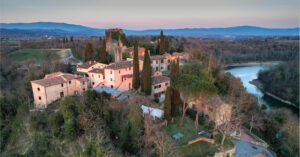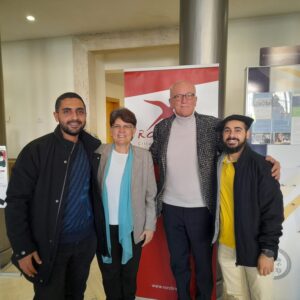Rondine Method at the Centre of an International Conference at the Pontifical Lateran University, 11th November, 2023
 The Rondine Peace Citadel, founded by Franco Vaccari in 1976 lies just 50 kms from Loppiano. Who would have thought that Tuscany could boast of two international towns? Rondine, which is the Italian word for “Swallow” and is the name of the Medieval town where the little town is situated, is an organization committed to reducing armed conflicts around the world and to spreading its own method for the creative transformation of conflicts in every context. It aims to contribute to a planet free from armed clashes, in which every person has the tools to manage conflicts in a creative and positive way. Its mission is expressed as follows, “to promote the creative transformation of conflict through the experiences of young people who discover their enemies as human beings”.
The Rondine Peace Citadel, founded by Franco Vaccari in 1976 lies just 50 kms from Loppiano. Who would have thought that Tuscany could boast of two international towns? Rondine, which is the Italian word for “Swallow” and is the name of the Medieval town where the little town is situated, is an organization committed to reducing armed conflicts around the world and to spreading its own method for the creative transformation of conflicts in every context. It aims to contribute to a planet free from armed clashes, in which every person has the tools to manage conflicts in a creative and positive way. Its mission is expressed as follows, “to promote the creative transformation of conflict through the experiences of young people who discover their enemies as human beings”.
The Rondine method was the subject of a recent conference entitled “Studies and Research on the Relational Approach to Conflict: Perspectives in Dialogue on the Rondine Method”. The event marked the beginning of a research project between Rondine Citadel of Peace and the Pontifical Lateran University. The aim is to address urgent societal issues, particularly in the current complex, accelerated, and conflict-ridden global context.
The Conference presented research and contributions from academics and educators involved in Rondine’s programs. The focus was on exploring the intellectual history that has shaped reflections on the relational approach to conflict proposed by Rondine.
The overarching goal was to offer concrete tools, including the Rondine Method, to prevent conflicts from escalating into hatred and violence. Instead, the emphasis is on transforming conflicts into opportunities for diverse encounters that generate shared and constructive visions, fostering perspectives of peace and development.
The program included institutional greetings, presentations of ongoing research, and discussions on the Rondine Method’s impact on conflict resolution. The conference also aspired to open new research perspectives through collaborative efforts, fostering dialogue between institutions and their partners. There were contributions from international guests and speakers such as Prof. Gerard Powers from the University of Notre Dame and Prof. Miguel Diaz from Loyola University. 
Prof. Daniela Ropealto, Associate Professor of Political Science and Director of the Doctoral School of Sophia University Institute gave a talk entitled, “Disarming Thought: Fraternity as a Paradigm”. This is a summary of her talk:

Prof. Ropelato reflected on the shared experiences and values of Sophia IUS and the Rondine Method in approaching conflict. She began by introducing the Sophia Institute, located within the Loppiano Citadel of the Focolare Movement. Sophia focuses on unity and dialogue, offering degrees in the culture of unity. Daniela expressed her gratitude for the invitation to the conference and emphasized the common ground between Sophia and Rondine in guiding young people, fostering intercultural dialogue, and building peace.
Her first key point was “Disarming Thought.” Ropelato highlighted the destructive nature of war, referencing ongoing conflicts in Ukraine and the Holy Land. She noted the polarized debates within society, emphasizing the need to disarm not only physically but also in terms of thoughts and attitudes. Drawing from the wisdom of Athenagoras I, Ropelato advocated for a war against oneself, overcoming fear through love. She explored the challenge of transforming personal conversion into social and peace-building actions.
Her second point revolved around “Fraternity as a Paradigm.” She discussed the urgency for a new paradigm amid global crises, referring to the concept of a “policrisis.” She emphasized the rediscovery of universal fraternity, a central theme in Pope Francis’s encyclical “Fratelli tutti.” The principle of fraternity is a focal point in Sophia’s academic agenda, studying its religious, political, legal, and economic dimensions. Ropelato sees fraternity as a foundational element for peace, freeing political action from strategic considerations and highlighting its essential anthropological dimension.
She concluded by acknowledging the utopian nature of the commitment of young people from Rondine, Sophia, and beyond. She drew inspiration from a metaphor about saving seeds during a flood, suggesting that, despite current challenges, preserving the essence of humanity through fraternity can lead to the emergence of new scenarios for peace.
https://rondine.org/
https://www.sophiauniversity.org/
https://rowman.com/ISBN/9781538177167/The-Rondine-Method-A-Relational-Approach-to-Conflict

